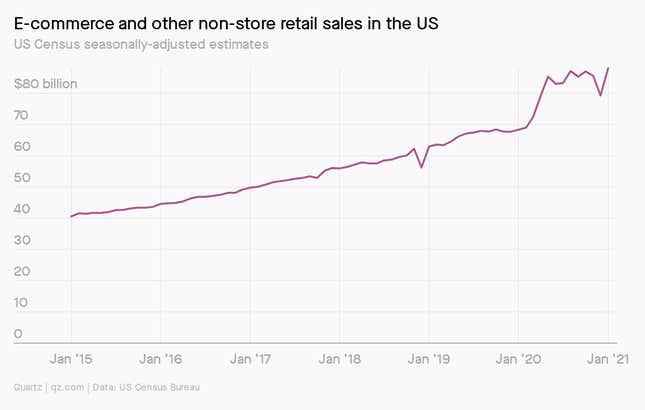Good morning, Quartz readers!
Here’s what you need to know
China’s got a new plan to transform manufacturing. It involves 5G and the internet of things.
The head of Amazon India refuted Reuters’ report. In an email to employees, Amit Agarwal called the news service’s claims “unsubstantiated, incomplete, and factually incorrect.”
Myanmar’s generals face more sanctions. The UK and Canada are the latest to take action.
Hong Kong’s population dropped for the first time since records began in 1961. The pandemic, a low birth rate, and emigration were factors in the decline.
US Democrats want to overhaul immigration… A new bill, backed by the president but likely to face fierce opposition from Republicans, would provide a path to citizenship for 11 million.
…and crack down on abuses in Xinjiang. A bill reintroduced in the House would ban imports of goods that rely on forced labor and allow more sanctions on Chinese officials.
Jimmy Lai was again denied bail. The Hong Kong High Court upheld a prior court decision to keep the Apple Daily founder in custody.
What to watch for
It’s multilateralism Friday. Buckle up.
Today, UK prime minister Boris Johnson will convene a virtual meeting of the Group of Seven nations to discuss the role democracies should play in pandemics—both this one and future ones. (RSVP’d yes: The leaders of the US, France, Germany, Italy, Canada, and Japan.)
The UK holds the rotating presidency of the G7 in 2021, and Johnson wants to use the platform to boost the image of Britain as a force for good in the world after Brexit. He also wants to start working on a joint China strategy, but that may be an uphill battle.
But wait, there’s more. Johnson and his colleagues Joe Biden, Emmanuel Macron, and Angela Merkel, will also appear at a special edition of the Munich Security Conference to lay out a “new transatlantic agenda.” Four years of Donald Trump damaged relations between the US and Europe, at a time when they face major common challenges, including climate change and the increasing influence of Russia and China. But Biden is hoping he can get things back on track.
Charting US e-commerce
US e-commerce sales soared nearly 30% in the last three months of 2020. And demand recently rose again after Congress approved $600 stimulus payments for individuals who earn up to $75,000.

But as Karen Ho explains, the fast-growing sector is on a collision course with climate change, as more frequent and more severe storms and phenomena like wildfires wreak havoc on delivery services, warehouses, and supply chains.
The Mars-Earth connection

NASA’s Perseverance rover made a successful landing on Mars on Thursday afternoon at 3:55pm US eastern time. This one huge step for a robot has pretty big ramifications for geopolitics, too. The red planet may seem a little crowded lately, with probes from China and the UAE arriving last week, but the timing was driven by its relative proximity to Earth last year when the missions launched.
It also represents a symbolic lineup: The reigning space power and its main competitor, along with a third nation outlining a new model of national space investment. Tim Fernholz explains why the world should keep its eye on the sky.
✦ While we love to have you orbiting around us, let’s get you firmly onto Planet Quartz. Try a membership free for a week.
You asked about India’s pandemic progress
Some experts are saying the pandemic is over in India. Is that true and if so, how did they do it?
It’s certainly what the data are indicating, though there’s some question about their reliability. Assuming they’re true, the most likely reason that Covid-19 failed to cause the projected 2 million deaths has a lot to do with the country’s quick response. Early and very strictly enforced lockdowns—though they caused other humanitarian crises—coupled with consistent urging of mask usage by the government seemed to keep the virus from spreading across regions.
But even hefty fines in some areas didn’t convince everyone to wear masks and practice social distancing, so why are India’s numbers looking so good? Some scientists think that South Asians do have some immunity against the virus. Plus, young people abound, and a case for herd immunity could be made. Manavi Kapur rounds up some theories.
Surprising discoveries
“The dogecoin market has a pack leader.” One anonymous person holds 28% of the joke cryptocurrency that Elon Musk has been championing.
Five men spent nearly four years stranded at sea. Now they’re back on dry land and can finally go home.
Who knew a fart machine could be so cute? Panasonic, when it made this farting cat robot.
Scientists taught pigs to play video games. Just wait until they hear about Angry Birds.
A 12th-century Islamic bathhouse was hiding behind the walls of a Spanish tapas bar. It was discovered during pandemic renovations.
Our best wishes for a productive day. Please send any news, comments, swine-appropriate video games, and hidden hammams to hi@qz.com. Get the most out of Quartz by downloading our iOS app and becoming a member. Today’s Daily Brief was brought to you by Annabelle Timsit, Karen Ho, Susan Howson, and Liz Webber.
